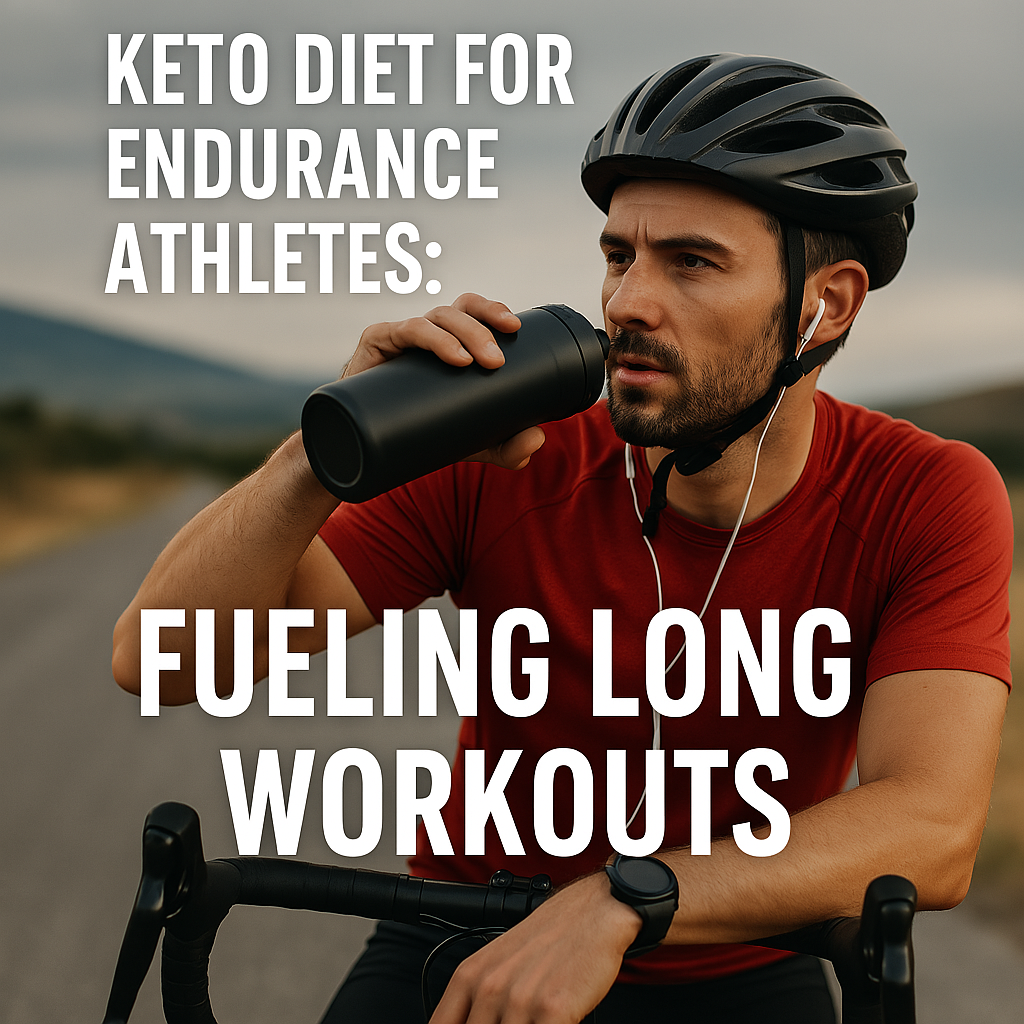
Keto Diet for Endurance Athletes: Fueling Long Workouts 2025 with healthy fats, improved energy, and optimized performance. Perfect for marathoners, cyclists, and triathletes.
Hey, endurance athletes! Whether you’re a marathon runner, cyclist, or triathlete, you know how important fueling your body is for those long, grueling workouts. But have you ever considered the keto diet as a way to optimize your performance? If you’re looking to maximize energy, improve endurance, and stay on top of your game, keto might just be the secret weapon you’ve been searching for. In this guide, we’ll explore how the keto diet can benefit endurance athletes and provide you with tips on how to fuel up for long workouts using this high-fat, low-carb approach.
What is the Keto Diet?
Before diving into how the keto diet can help endurance athletes, let’s break it down. The ketogenic diet (or keto diet) is a high-fat, moderate-protein, low-carbohydrate diet that forces the body to burn fat for fuel instead of carbohydrates. When you drastically reduce your carb intake, your body enters a state called ketosis, where it produces ketones from fat, which it then uses for energy. This metabolic switch can be a game-changer, especially for endurance athletes looking to tap into their fat stores for sustained energy.
Why Endurance Athletes Should Consider Keto
1. Sustained Energy Levels
The key benefit of the keto diet for endurance athletes is its ability to provide a steady, long-lasting source of energy. While carbs provide quick bursts of energy, they can also cause energy crashes when they’re used up. On the other hand, fat is a more stable energy source that can fuel you for hours during long-distance events or training. The body’s ability to tap into fat stores for fuel means fewer dips in energy during extended efforts.
2. Improved Fat Burning Efficiency
On a high-carb diet, the body relies mostly on glucose for energy. However, once you deplete your glycogen stores during long workouts, you can hit a wall—known as “bonking.” By training your body to burn fat as its primary energy source, you reduce the risk of bonking and improve your fat-burning efficiency. This allows you to go longer distances without the need for constant fueling.
3. Mental Clarity
Endurance events often require mental toughness. Ketones are a highly efficient fuel for the brain, meaning that following a keto diet can improve focus and cognitive function. When you’re not distracted by energy crashes or hunger pangs, you’re more likely to stay sharp and perform better during long workouts.
4. Reduced Inflammation and Faster Recovery
The keto diet has anti-inflammatory effects, which can be beneficial for endurance athletes who put their bodies through rigorous training. By reducing inflammation, the keto diet may help speed up recovery time, allowing you to train more effectively and with less muscle soreness.
How to Fuel Your Long Workouts on Keto
One of the biggest concerns for endurance athletes on the keto diet is how to fuel during long workouts or races. While carbs are traditionally the go-to for refueling during endurance events, the keto diet requires a different approach. Here are some tips on how to fuel up while staying true to the keto lifestyle:
1. Pre-Workout Fueling
Before a long workout, you’ll want to make sure your body is properly primed with enough fat to sustain you. A pre-workout meal or snack should focus on healthy fats and moderate protein, with minimal carbohydrates. Here are some examples of great pre-workout meals:
-
Avocado and eggs: A healthy, protein-packed meal that will keep you fueled and satisfied.
-
Chia seed pudding: Made with almond milk and a handful of berries, chia seeds provide omega-3 fatty acids and fiber to keep you energized.
-
Coconut oil coffee: A quick option that provides healthy fats to get you through a morning workout.
2. During the Workout
Unlike athletes who rely on sugary sports drinks or gels, keto athletes can fuel during workouts using fat-based sources. The key is to make sure you have a portable source of fat that’s easy to digest. Consider these keto-friendly fueling options:
-
MCT oil: Medium-chain triglycerides (MCT) are rapidly absorbed by the body and provide quick energy. Add MCT oil to your water bottle or a smoothie for a convenient, fat-based energy source.
-
Nut butter packets: A great, easy-to-carry option packed with healthy fats and a little protein.
-
Cheese sticks: For a savory option, cheese is a great source of fat and protein.
3. Post-Workout Recovery
Recovery is just as important as the workout itself, and the keto diet can help here too. After a long workout, you’ll need to replenish electrolytes, repair muscles, and provide your body with the nutrients it needs. Post-workout meals should include healthy fats and protein to aid in muscle recovery and help replenish any lost electrolytes.
Here are some good post-workout meal ideas:
-
Salmon with avocado: Rich in omega-3 fatty acids, salmon provides protein for muscle recovery, while avocado adds healthy fats.
-
Keto smoothie: Blend protein powder, avocado, spinach, and coconut milk for a quick, nutrient-dense recovery drink.
-
Bone broth: Rich in collagen and electrolytes, bone broth is a great way to rehydrate and support joint recovery.
How to Transition to Keto as an Endurance Athlete
If you’re new to the keto diet and are considering transitioning from a high-carb diet, here are some tips to help you make the switch:
1. Start Slowly
Going from a high-carb diet to keto can be a big change. To avoid the dreaded “keto flu,” it’s best to gradually reduce your carb intake over a few weeks rather than making a drastic change overnight. This will give your body time to adjust to burning fat as fuel.
2. Stay Hydrated
When you cut carbs, your body will excrete more water and electrolytes, which can lead to dehydration. Be sure to drink plenty of water and consider supplementing with electrolytes to avoid any negative side effects.
3. Test Your Performance
Transitioning to keto may affect your performance in the short term. During the first few weeks, you may experience some dips in energy as your body adapts to burning fat instead of carbs. However, once your body fully adapts to ketosis, you’ll likely experience sustained energy during long workouts and improved endurance.
Keto Meal Ideas for Endurance Athletes
Here are some keto-friendly meals that can help fuel your workouts and keep you on track:
1. Keto Chicken Salad
A light, protein-packed meal perfect for post-workout recovery.
Ingredients:
-
2 cups cooked chicken (shredded)
-
1 avocado (diced)
-
1/4 cup chopped celery
-
2 tbsp mayonnaise (keto-friendly)
-
Salt and pepper to taste
Instructions:
-
Mix all ingredients in a bowl.
-
Serve chilled or at room temperature.
2. Keto Energy Balls
These energy balls are perfect for a quick snack before or after a workout.
Ingredients:
-
1/2 cup almond flour
-
1/4 cup coconut flakes
-
2 tbsp almond butter
-
2 tbsp MCT oil
-
1 tbsp chia seeds
Instructions:
-
Combine all ingredients in a bowl and mix well.
-
Roll into small balls and store in the fridge for a quick energy boost.
3. Keto Avocado Smoothie
A creamy, fat-filled smoothie that’s great for a post-workout recovery drink.
Ingredients:
-
1/2 avocado
-
1 scoop protein powder
-
1 cup unsweetened almond milk
-
Ice cubes
Instructions:
-
Blend all ingredients together until smooth.
-
Serve chilled.
FAQs about Keto for Endurance Athletes
1. Can I do endurance sports on a keto diet?
Yes! Many endurance athletes successfully train and compete on a keto diet. The key is allowing your body time to adapt and fueling properly with fat-based sources during workouts.
2. Do I need to carb-load before races if I’m on keto?
No, you don’t need to carb-load on keto. Instead, focus on making sure you’re well-fueled with healthy fats before the race and have fat-based snacks available during the event.
3. Can I combine keto with intermittent fasting for endurance?
Yes, combining keto with intermittent fasting is a popular approach for endurance athletes looking to optimize fat burning and energy levels. Just make sure you’re fueling properly when you do eat.
4. Will keto affect my performance at first?
It may take a few weeks for your body to adapt to the keto diet. During this period, you may experience lower energy levels, but once your body becomes fat-adapted, you’ll likely experience improved endurance and stamina.
Conclusion
The keto diet can be a powerful tool for endurance athletes looking to improve their performance, sustain energy, and recover faster. By fueling with healthy fats and adjusting your nutrition strategy, you can optimize your workouts and race performance. Remember, transitioning to keto may take time, so be patient and listen to your body. With the right approach, you’ll be able to go the distance and reach new personal bests. Happy training!


